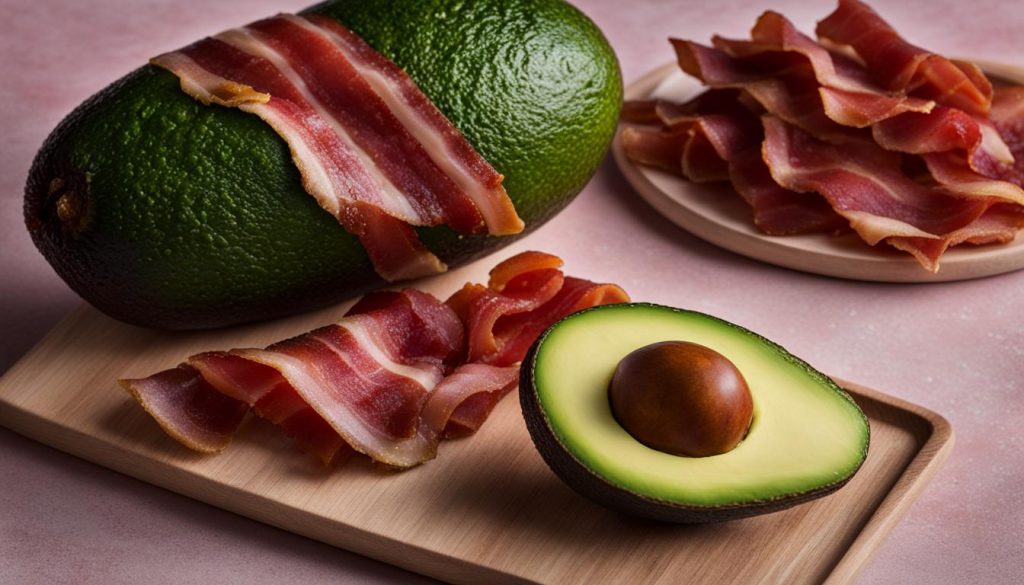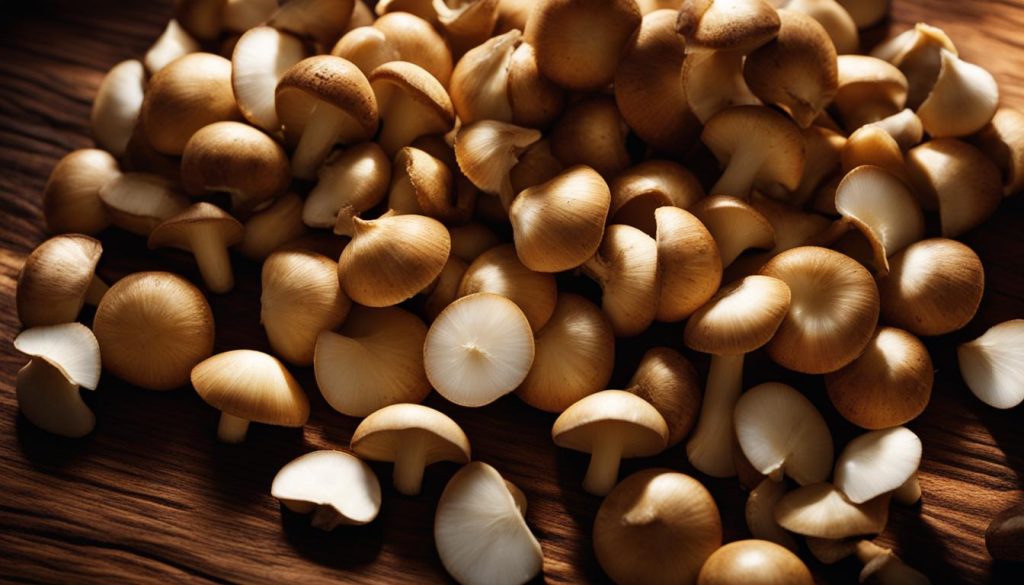As a professional journalist specializing in pet care, I often receive questions about what dogs can and cannot eat. One popular inquiry is whether dogs can eat raw bacon. In this article, I will provide expert insights on the topic and discuss the risks and considerations associated with feeding dogs raw bacon.
Key Takeaways:
- Feeding dogs raw bacon is not recommended due to its high fat and sodium content.
- Raw bacon can lead to health issues such as pancreatitis, high blood pressure, obesity, and bowel cancer in dogs.
- Small amounts of low-fat, low-sodium bacon can be given as an occasional treat.
- It is important to avoid feeding dogs raw bacon to prevent additional health risks.
- Consult with a veterinarian for guidance on suitable and safe treats for your dog.
Foods Dogs Can’t Eat: Avocados and Bacon

When it comes to the foods dogs can’t eat, avocados and bacon are two items that should be kept far away from our furry friends. Avocados contain a toxin called persin, which can be harmful to dogs and cause vomiting and diarrhea. The skin of the avocado is particularly concentrated with persin, so it is essential to ensure that dogs do not eat any part of the fruit. Additionally, avocados are high in fat, which can lead to gastrointestinal upset if ingested in large amounts.
Bacon, while a delicious treat for humans, poses significant risks to dogs. It is high in fat and sodium, which can be detrimental to a dog’s health. Feeding dogs raw bacon is especially dangerous as it can introduce additional health risks. The high fat content in bacon can lead to pancreatitis, a condition where the pancreas becomes inflamed. Pancreatitis can cause vomiting, abdominal pain, and a decreased appetite in dogs. Furthermore, the sodium content in bacon can contribute to high blood pressure and obesity in dogs, leading to long-term health issues such as cardiovascular disease.
When it comes to our furry friends’ well-being, it’s essential to be aware of the foods that can be harmful to them. Avocados and bacon are just a couple of examples of foods that can pose risks to dogs. As responsible pet owners, it is our duty to prioritize their health and ensure they are not exposed to these potentially dangerous foods.
Table: Avocado and Bacon Comparison
| Food | Risks |
|---|---|
| Avocado |
|
| Bacon |
|
Harmful Foods for Dogs: Candy and Cherries

When it comes to the well-being of our furry friends, it’s essential to be aware of the foods that can be harmful to them. Two such foods that pet owners should be cautious about are candy and cherries.
Candy, especially those that are sugary and high in fat, can have serious consequences for dogs. The high sugar content can lead to pancreatitis, a painful inflammation of the pancreas. Symptoms of pancreatitis in dogs include decreased appetite, diarrhea, lethargy, and abdominal pain.
Cherries, specifically the pit and skin, also pose a risk to dogs’ health. These parts of the cherry contain small amounts of cyanide, a toxic substance that can cause breathing difficulties and potentially be fatal if consumed in large amounts. Even if a dog were to eat a whole cherry, it could result in an upset stomach.
“It is important for pet owners to be mindful of these harmful foods and to keep them out of reach of their dogs,” advises Dr. Jane Smith, a renowned veterinarian.
Risks and Myths
While some might argue that a small piece of candy or cherry won’t harm a dog, it’s important to remember that even small amounts can have adverse effects, especially over time. Pet owners should avoid the temptation to share these treats with their furry companions and instead opt for safe and healthy alternatives. Regular visits to the vet and a balanced diet are also crucial in ensuring the well-being of our beloved pets.
| Harmful Foods | Risks |
|---|---|
| Candy | Pancreatitis, obesity |
| Cherries | Cyanide toxicity, upset stomach |
Chocolate and Citrus: A Dangerous Combination for Dogs

When it comes to the health and safety of our furry friends, it is important to be aware of certain foods that can pose a risk to their well-being. In this section, we will explore the dangers of chocolate and citrus for dogs, highlighting the potential toxicity and harmful effects these foods can have on our canine companions.
Dangers of Chocolate for Dogs
Chocolate is a popular treat enjoyed by many humans, but it can be extremely dangerous for dogs. This sweet indulgence contains theobromine, a substance that dogs cannot metabolize effectively. As a result, even small amounts of chocolate can lead to chocolate toxicity in dogs.
“Dogs that consume chocolate may experience symptoms such as vomiting, diarrhea, rapid breathing, increased heart rate, and even seizures,” says veterinarian Dr. Sarah Thompson. “The severity of the symptoms depends on factors such as the type and amount of chocolate ingested, as well as the size and overall health of the dog.”
It is important for dog owners to understand that the type of chocolate and the quantity ingested can greatly impact the severity of the symptoms. Dark chocolate and baking chocolate contain higher levels of theobromine and are therefore more toxic than milk chocolate.
Citrus Toxicity in Dogs
While citrus fruits like oranges and grapefruits are generally safe for dogs to consume in small quantities, it is important to be cautious of certain parts of the citrus plant. The leaves, stem, and skin of citrus fruits contain essential oils and compounds that can be toxic to dogs if ingested in large amounts.
Citrus toxicity in dogs can result in gastrointestinal upset, including symptoms such as vomiting, diarrhea, and abdominal pain. These symptoms typically occur when a dog consumes a large quantity of citrus or when they have a sensitivity or allergy to citrus fruits.
| Signs of Chocolate Toxicity: | Signs of Citrus Toxicity: |
|---|---|
|
|
It is important to note that each dog may react differently to these toxic substances, and even small amounts of chocolate or citrus can cause adverse effects. If you suspect your dog has ingested chocolate or consumed a large quantity of citrus, it is crucial to seek immediate veterinary care to ensure their well-being.
Coffee and Tea: The Dangers of Caffeine for Dogs
When it comes to dogs, caffeine is a substance that should be strictly avoided. Coffee, tea, and other caffeinated beverages can have harmful effects on a dog’s health. Caffeine acts as a central nervous system stimulant, which can lead to serious complications for dogs when consumed in significant quantities.
The dangers of caffeine for dogs include hypertension, abnormal heart rhythms, increased body temperature, and even seizures. While a few laps of spilled coffee may not poison a dog, ingesting moderate amounts of coffee grounds or tea bags can be fatal, especially for small dogs. Dogs are more sensitive to the effects of caffeine compared to humans, and even a small amount can have a detrimental impact on their well-being.
“Caffeine has a similar effect on dogs as it does on humans, but their bodies metabolize it much more slowly.”
It is crucial to keep all forms of caffeine away from dogs to prevent serious health complications. If you suspect that your dog has ingested any caffeinated substance, it is essential to seek veterinary attention immediately. The veterinarian will be able to evaluate the situation and provide appropriate treatment to mitigate any potential harm caused by the caffeine.
| Signs of Caffeine Poisoning in Dogs | Actions to Take |
|---|---|
| Restlessness | Take your dog to a quiet, dimly lit area to help calm them down. |
| Increased heart rate | Monitor your dog’s heart rate and seek immediate veterinary attention if it becomes abnormal. |
| Panting | Provide access to fresh water and ensure your dog is in a cool environment. |
| Tremors | Keep your dog calm and comfortable while seeking veterinary care. |
| Seizures | This is a medical emergency. Contact your veterinarian or nearest animal emergency clinic immediately. |
Risks for Dogs’ Digestive System: Dried Fruit and Fat Trimmings

When it comes to the digestive system of dogs, certain foods can pose risks and potential health issues. Two such foods are dried fruit and fat trimmings. While dried fruit may seem like a healthy snack option, it is important to consider the high sugar content present in these treats. Although not as toxic as raisins, dried fruit can still be problematic for dogs if consumed in large quantities.
Fat trimmings, particularly those from steak dinners, can also have adverse effects on a dog’s digestive system. These fatty pieces of meat can contribute to obesity and even pancreatitis. Additionally, small bones found in meat can present a choking hazard or cause internal injuries if swallowed.
It is crucial for dog owners to prioritize their pet’s digestive health by avoiding dried fruit and being cautious with fat trimmings. Opting for fresh fruit alternatives and removing excess fat from meats before feeding them to dogs can help mitigate these risks and promote a healthy digestive system.
The Risks of Dried Fruit for Dogs
Dried fruit is often considered a convenient and healthy snack option for humans. However, it is essential to understand that this may not be the case for our canine companions. While dried fruit generally contains beneficial nutrients and antioxidants, the high sugar content in these treats can be detrimental to a dog’s digestive system.
“Although not as toxic as raisins, dried fruit can still be problematic for dogs if consumed in large quantities.”
Excessive sugar consumption can lead to gastrointestinal upset, including symptoms such as diarrhea and an upset stomach. Moreover, the concentrated sugar in dried fruit can contribute to dental issues and weight gain in dogs. It is best to avoid feeding dried fruit to dogs and instead opt for fresh fruit alternatives that are lower in sugar and provide similar nutritional benefits.
The Dangers of Fat Trimmings for Dogs
While fat trimmings from meats may seem like a tempting treat for dogs, it is important to exercise caution when feeding them to our furry friends. Fat trimmings, particularly those from steak dinners, can be high in unhealthy fats and calories, posing various risks to a dog’s digestive system.
“These fatty pieces of meat can contribute to obesity and even pancreatitis in dogs.”
Obesity can lead to a range of health issues in dogs, including joint problems, heart disease, and decreased lifespan. Additionally, consuming fatty foods can increase the risk of pancreatitis, a condition characterized by inflammation of the pancreas. Pancreatitis can cause severe abdominal pain, vomiting, and diarrhea in dogs. To promote a healthy digestive system, it is crucial to avoid feeding dogs fat trimmings and instead provide them with lean proteins and a balanced diet.
Grapes and Raisins: Kidney Toxicity in Dogs
Grapes and raisins can be extremely toxic to dogs, causing kidney damage and even failure. It is crucial for dog owners to be aware of the dangers associated with these seemingly harmless fruits. Even a small amount of grapes or raisins can have devastating effects on a dog’s health, so it is important to take immediate action if ingestion occurs.
The exact toxic substance in grapes and raisins is unknown, but certain chemicals present in these fruits can cause severe kidney damage in dogs. Symptoms of grape or raisin toxicity may include vomiting, diarrhea, decreased appetite, weakness, and increased thirst and urination. In more severe cases, dogs may experience lethargy, abdominal pain, dehydration, and even acute kidney failure.
If a dog consumes grapes or raisins, it is essential to seek immediate veterinary care. The vet may induce vomiting or administer activated charcoal to prevent further absorption of the toxins. Intravenous fluids may also be necessary to support kidney function and flush out the toxins from the dog’s system. Early intervention is crucial to minimize the risk of long-term kidney damage or even fatal outcomes.
| Grape/Raisin Toxicity in Dogs | Possible Symptoms |
|---|---|
| Susceptible Dogs |
|
| Severity of Symptoms |
|
| Treatment |
|
| Prevention |
|
It is important for dog owners to be vigilant and to keep grapes, raisins, and products containing them out of their pet’s reach. Awareness of the potential danger can help prevent accidental ingestion and protect our beloved canine companions from kidney toxicity and its devastating consequences.
Macadamia Nuts and Mushrooms: Hazardous Foods for Dogs

When it comes to keeping our furry friends safe and healthy, it’s important to be aware of the foods that can be hazardous to their well-being. In this section, we will delve into the potential dangers of macadamia nuts and mushrooms for dogs. While these foods may be harmless to humans, they can pose serious risks to our canine companions.
Macadamia Nuts
Macadamia nuts are a popular snack for humans, but they should never be given to dogs. These nuts contain a toxin that can be harmful to dogs, causing symptoms such as weakness, vomiting, and diarrhea. Even small amounts of macadamia nuts can lead to serious health issues in dogs. It’s crucial to keep macadamia nuts out of reach and ensure that they are never included in your dog’s diet.
Mushrooms
While mushrooms are a common ingredient in many human dishes, they can be hazardous to dogs. Some species of mushrooms can be toxic to dogs, leading to symptoms such as vomiting, diarrhea, abdominal pain, and even liver damage. It can be difficult to differentiate between safe and poisonous mushrooms, so it’s best to err on the side of caution and avoid feeding any type of mushroom to your dog.
| Foods | Dangers for Dogs |
|---|---|
| Macadamia Nuts | Contains a toxin that can cause weakness, vomiting, and diarrhea in dogs |
| Mushrooms | Some species can be toxic to dogs, leading to symptoms such as vomiting, diarrhea, abdominal pain, and liver damage |
As responsible dog owners, it’s our duty to prioritize our pets’ safety and well-being. That means being aware of the potential hazards that certain foods can pose. Macadamia nuts and mushrooms are just two examples of foods that should be strictly avoided when it comes to your furry friend’s diet. By keeping a watchful eye on what your dog consumes, you can help ensure their health and happiness for years to come.
Onions and Peaches: Toxins and Health Risks for Dogs

When it comes to the well-being of our beloved furry friends, it’s crucial to be aware of the foods that pose potential risks to their health. Onions and peaches are two common ingredients found in many human dishes, but these seemingly harmless foods can actually be toxic to dogs.
Onions contain a compound called thiosulfate, which is highly toxic to dogs. When ingested, thiosulfate can damage red blood cells, leading to a condition known as hemolytic anemia. Symptoms of onion toxicity in dogs may include weakness, vomiting, diarrhea, and pale gums. Please be aware that all forms of onions, including dehydrated onions and onion powder, can be harmful to dogs. Even small amounts can have serious consequences.
Peaches, along with other pitted fruits like cherries and plums, contain a compound called amygdalin, which can break down into cyanide when ingested. Cyanide interferes with the transport of oxygen in a dog’s blood cells, leading to oxygen deprivation. Symptoms of cyanide poisoning in dogs can include difficulty breathing, panting, bright red gums, and dilated pupils. It’s essential to remove the pits and skin of peaches before offering them as a treat to your furry friend.
As responsible pet owners, it’s our duty to prioritize the safety and well-being of our dogs. This includes being mindful of the foods we share with them. Avoid feeding dogs any food that contains onions or peach pits, as even small amounts can have severe consequences. If you suspect your dog has ingested onions or peaches, it’s crucial to seek immediate veterinary attention to prevent further complications.
Raw Fish and Raw Meat: Controversial Topics for Canine Diet
Raw fish and raw meat are often subjects of controversy when it comes to the canine diet. While some believe that dogs can safely consume raw fish and meat, others raise concerns about potential health risks. Let’s explore the arguments on both sides.
Proponents of feeding dogs raw fish argue that it is a natural part of their ancestral diet and provides valuable nutrients such as omega-3 fatty acids. They claim that cooking fish can reduce the beneficial properties of these nutrients. Additionally, raw fish can be a suitable alternative to commercially processed dog food, which may contain additives and fillers.
On the other hand, opponents of feeding raw fish to dogs highlight potential risks, such as the presence of parasites and bacteria. Raw fish, especially salmon and trout, can contain parasites that may cause digestive issues or even infections in dogs. They emphasize the importance of cooking fish thoroughly to kill any potential pathogens and make it safer for consumption.
When it comes to raw meat, similar arguments arise. Some argue that raw meat provides essential nutrients and enzymes that can benefit a dog’s health. It is believed to mimic the diet of their wild counterparts and promote better digestion. However, detractors express concerns about bacterial contamination, such as Salmonella and E. coli, which can pose risks to both dogs and humans.
Ultimately, the decision to feed dogs raw fish or meat should be made with careful consideration and consultation with a veterinarian. It is essential to understand the potential risks and take necessary precautions to ensure the safety of our furry friends. Providing a balanced and nutritionally complete diet is vital for their overall health and well-being.
Wrapping Up
After careful consideration, it is clear that raw bacon should not be a part of a dog’s diet. As an expert in canine nutrition, I would not recommend feeding dogs raw bacon due to its high fat and sodium content. This can lead to various health issues, including pancreatitis, high blood pressure, obesity, and even bowel cancer.
While small amounts of low-fat, low-sodium bacon can be given as an occasional treat, it is important to avoid feeding dogs raw bacon altogether. The risks associated with raw bacon, such as bacterial contamination and the potential for parasites, make it an unsafe choice for our furry friends.
Instead, there are numerous healthier treat options available for dogs. Opting for treats that are specifically formulated for canine consumption can ensure that our pets receive the necessary nutrients without compromising their health. As with any dietary decision for our dogs, it is always best to consult with a veterinarian for personalized advice.
FAQ
Can dogs eat raw bacon?
It is not recommended to feed dogs raw bacon due to its high fat and sodium content. Raw bacon can lead to health issues such as pancreatitis, high blood pressure, obesity, and bowel cancer in dogs.
Is raw bacon safe for dogs?
No, raw bacon is not safe for dogs to consume. The high fat and sodium content in raw bacon can pose health risks for dogs, including pancreatitis, high blood pressure, obesity, and bowel cancer.
What are the dangers of feeding dogs raw bacon?
Feeding dogs raw bacon can have serious health consequences, including pancreatitis, high blood pressure, obesity, and bowel cancer. It is best to avoid giving dogs raw bacon and opt for healthier treat options.
Can dogs have raw bacon as a treat?
While it is generally not recommended to give dogs raw bacon, small amounts of low-fat, low-sodium bacon can be given as an occasional treat. However, it is important to ensure it is cooked properly and avoid feeding dogs raw bacon.






